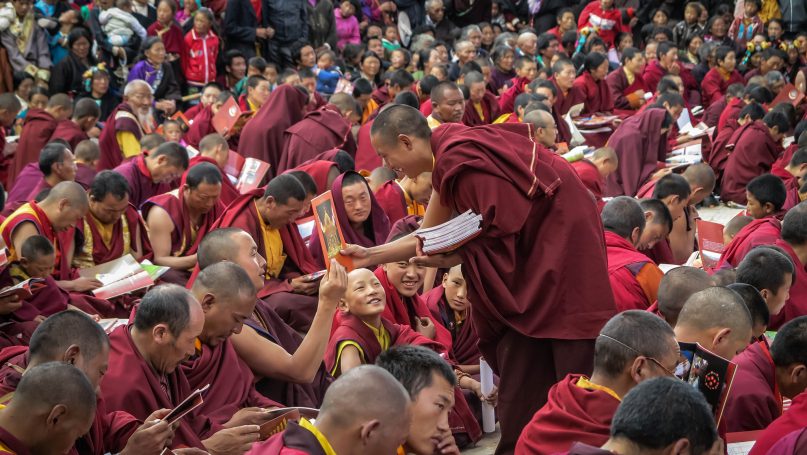
Scratch the surface of many IR issues and you will find, significant or not, interesting or banal, some element of religion. At times this discovery confirms our existing views of religious actors or traditions. More often, however, the opposite effect occurs – what we thought we knew about the predictabilities of religious behavior is confounded or amended by political events and the role that religious actors play within them.
Consider, for example, the bewildering conflict between China’s Communist authorities and the 14th Dalai Lama over, of all things, the question of reincarnation. The National People’s Congress, held in Beijing in March this year, reaffirmed the right of China’s political authorities to adjudicate on the spiritual migration of the highest religious authority in Tibetan Buddhism. The statement was provoked by the staggering suggestion by the present Dalia Lama about the possible cessation of his own reincarnation. Beijing subsequently accused him of blasphemy against Tibetan Buddhism. Far from predictable, the complex dynamics that undergird this controversy challenge conventional wisdom about the intersection of international politics and religion in two important ways.
The first challenge concerns political behavior, notably, what we thought we knew about a ‘Communist’ view of religion. The initial surprise, that an officially atheist regime would bother to have a view on the matter of spiritual rebirth at all, is explained via a strategic logic of control that rightly equates reincarnation with what we might call religio-political succession. When an ageing 14th Dalai Lama passes away, Beijing clearly hopes for someone more politically compliant to be reborn as the 15th Holiness. Someone, perhaps, like Bainqen Erdini Qoigyijabu, a member of the Chinese People’s Political Consultative Conference and the 11th Panchen Lama, the second highest authority in Tibetan Buddhism. Handpicked by China in 1995 after rejecting the exiled Dalai Lama’s identification of another child, the Panchen Lama represents a deeper challenge to our assumptions, namely, the choice by Communist authorities to work within the logic of a religious tradition in order to control it. Religion, as studies of Soviet manipulation of ethno-religious identities also reveal, can in some periods be viewed by Communist authorities as the opiate of the people, but in others will be engaged as the agent of the Politburo. In both cases, religion plays a central role in the exercise of Communist power.
The second challenge concerns religious behavior, in particular, what we thought we knew about Tibetan Buddhism. Any statement suggesting that the average lay person might assume to know anything about a Buddhist tradition begun on the Tibetan Plateau in the 8th Century CE is counted by the view that His Holiness the 14th Dalai Lama has been an international diplomat and (as uncomfortable as it is to say) celebrity for decades. Moreover, his epoch has coincided with an exponential growth of interest in Buddhism in the West. However, the Dalai Lama’s fame creates assumptions about the Buddhist tradition that can mislead. For instance, the view that Buddhism is always a religion of peace is now challenged by studies identifying Buddhist actors and belief-systems that engage in violence. The Dalai Lama is not included here. Yet a second view is that the Tibetan religious struggle is one primarily of Buddhist preservation in the face of Communist destruction. This is easily deduced when the beauty of ancient temples, traditions and teachings are at the forefront of a nation’s identity, as it is with the Tibetan people.
We would be wrong, however, to equate preservation of a culture with religious conservatism or quietism in the face of a modern world. The Dalai Lama has shown time again that religious traditions have the capacity of innovate, adopt, even coopt modern influences for their own growth and success. Could we offer an authoritative theological comment on the Dalai Lama’s suggestion that Buddhist rebirth can cease? Likely not. Can we observe that such a statement represents a nimble wielding of spiritual tradition in answer to a present and grave political danger, namely, that China will control the nomination of the new Dalai Lama as it did with the Pachen Lama thereby sealing its hegemonic hold on the Tibetan people? Indeed we can, and in this, we learn something of the unique resources available to religions as they participate in the world of power.
Further Reading on E-International Relations
- China’s Nation-Building Strategies and United Front Work for Tibetan Leadership
- Opinion – Taiwan Could Be to China What Canada Is to the US
- Mongolian Independence and the British: The Parallel Negotiation
- Mongolian Independence and the British: Twentieth-Century Geopolitical Notes
- The End of the Manchu Dynasty and Tibetan Independence
- Globalized Authoritarianism: The Expansion of the Chinese Surveillance Apparatus